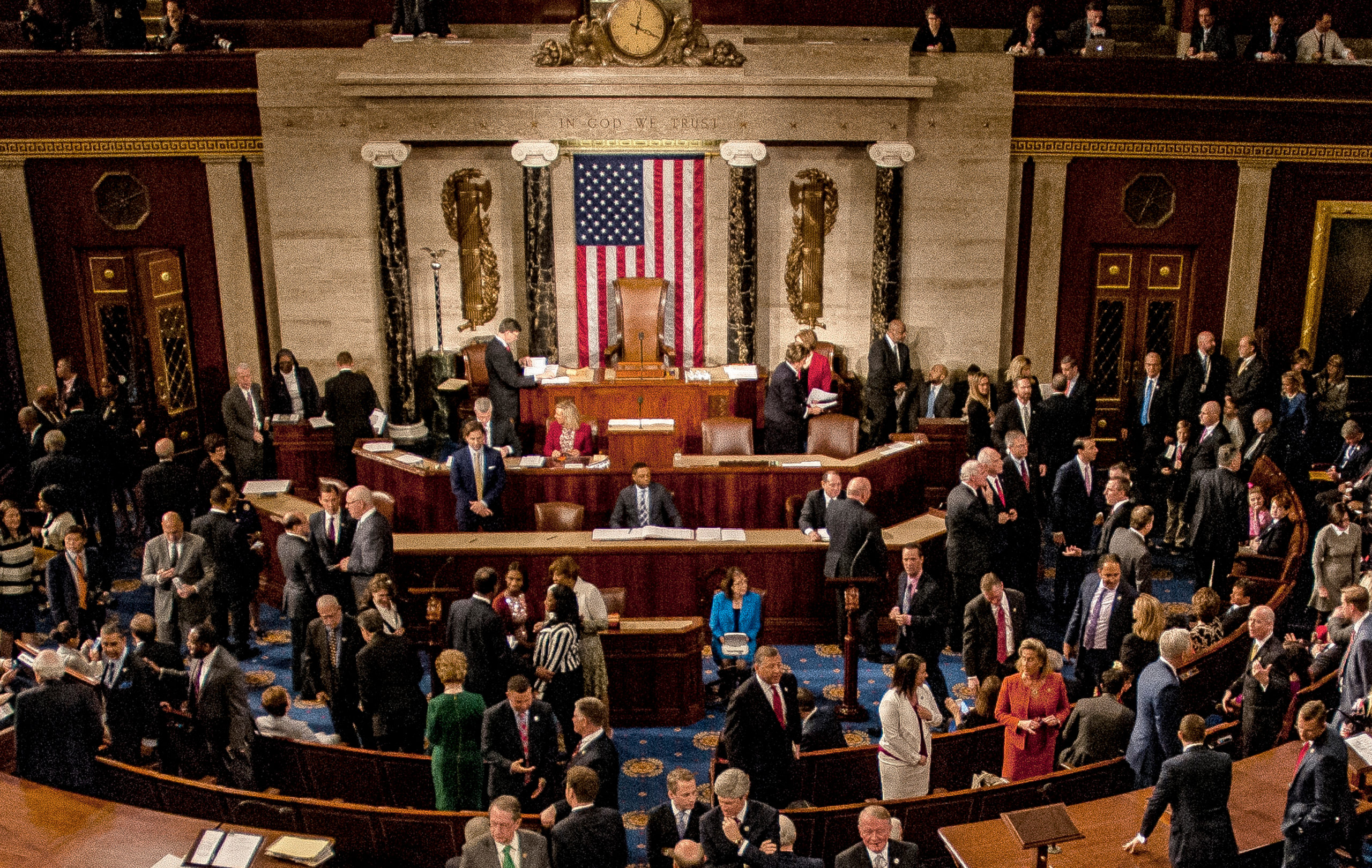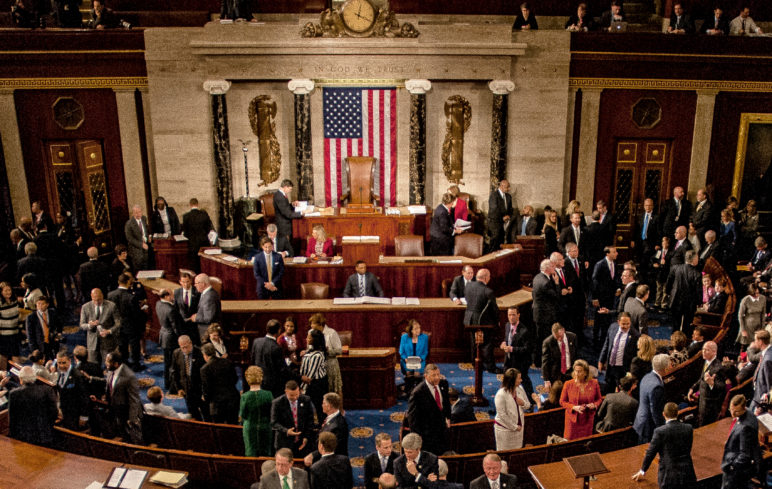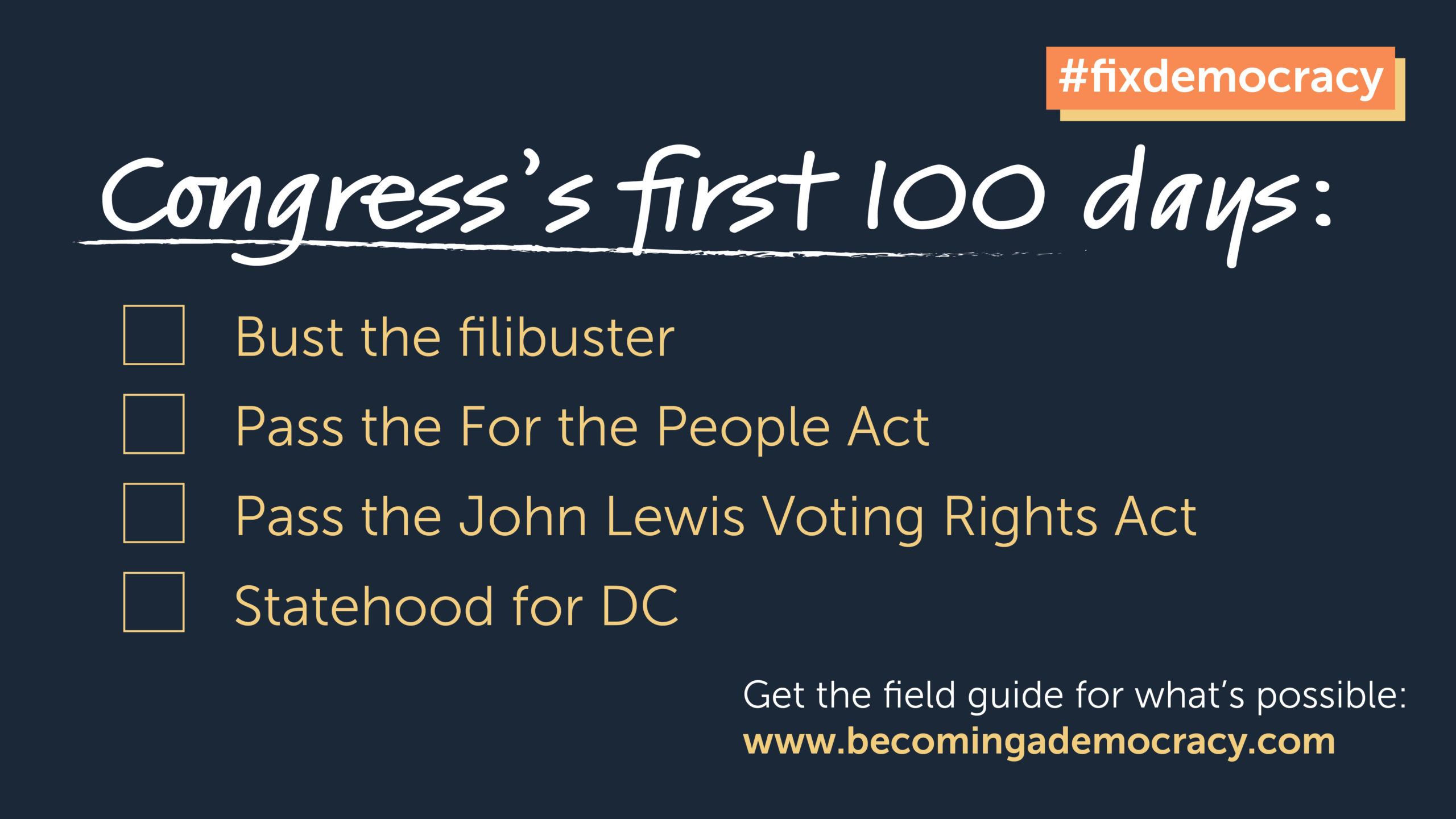Democrats have the Senate, House, and White House. They also have a lot on their plates: addressing a coup attempt fueled by a sitting president, fighting a pandemic and its economic fallout, plus all the accelerating problems of inequality, infrastructure, health care, and climate change. But America needs to put on its oxygen mask first. Without a functioning democracy, we have no hope of addressing our other pressing challenges.
The good news is, the three bills the country needs to safeguard democracy are already written and have already passed the House. The House needs to pass them again and then get them through the Senate. To do that, Democrats will first need to restore majority rule to the Senate.
 Bust the filibuster
Bust the filibuster
Even though Democrats won a majority of seats in the House and the Senate, the sad truth is that’s not enough to actually pass many laws. Republicans will filibuster until the cows come home, forcing supermajorities—60 votes—to pass legislation, rather than a simple majority. Since supermajorities are unheard of in this hyperpartisan era, Democrats will be forced to sit on their hands and voters will wait in vain for their duly-elected lawmakers to take action on priority measures.
Bust the filibuster first. Even though Democrats won a majority of seats in the House and the Senate, the sad truth is that’s not enough to actually pass many laws. Republicans will filibuster until the cows come home.

To make progress on anything else, Democrats will need to bust the filibuster so they can pass laws by majority vote. Some moderate Democrats have said they want to keep the filibuster. But maybe, if the House keeps pumping out critical bills that the country needs now, and the Senate GOP keeps filibustering them, just maybe, moderates will see that, to do their job and take care of their constituencies, they’ll need to nix the filibuster.
Pass the “For the People Act”
Congress’s first order of business should be to protect voters and elections. The House prioritized and passed a package of protections in 2019, but Mitch McConnell wouldn’t bring it to a vote in the Senate.
Importantly, the Act would make it law that “the right to vote is a fundamental right of citizens of the United States.” It may come as a shock to many Americans to know that this would be new. That’s right, voting is not in fact a fundamental right in America! But it should be. And Congress can make it so.
The bill is chock-a-block with protections for voting, campaign finance reform, and ethics improvements, but here are some highlights:
- No more purges (Section 2502). States would not be allowed to remove voters from the rolls without objective and reliable evidence that they are ineligible and in any case not within six months before an election.
- Automatic Voter Registration (Section 1011). Eighteen states have already taken this common sense step of automatically registering American citizens to vote once they proved their citizenship at a government agency. This bill would bring the other states up to speed.
- Early voting (Section 1611). All states must allow early voting at least 15 days before the election.
- Vote By Mail (Section 1621). All states must allow any eligible voter to vote absentee, and give them a chance to fix any problems before throwing their ballot away.
- Independent redistricting (Section 2411). Requires redistricting to be conducted by an independent state commission. This is particularly critical to prevent a “festival of partisan gerrymandering” in 2021.
Pass the John Lewis Voting Rights Act
The House passed the John Lewis Voting Rights Act in 2020, and it has majority support in the Senate (every Democrat and Independent, plus Republican Lisa Murkowski of Alaska). But it didn’t have a supermajority. The House should prioritize passing it again and sending it to the Senate where, if the majority is allowed to do its job, it could pass.
In 2013, the US Supreme Court gutted the Voting Rights Act. The John Lewis Voting Rights Act would restore it. Section 4 of the Voting Rights Act required places with a history of racial discrimination to “preclear” any voting changes with the US Attorney General. The Supreme Court in effect said “those places used to suppress Black voters, but they don’t anymore, so Congress needs to come up with a new way to determine which places currently need to be stopped from suppressing Black voters.” Ironically, the preclearance requirement had presented blatant voter suppression, and by waiving it, the Supreme Court allowed many places to discriminate against Black voters again. Which they did. Which gave Congress a current basis for requiring preclearance. The John Lewis Voting Rights Act would require any place where a federal court had found “a denial or abridgement of the right of any citizen of the United States to vote on account of race, color, or membership in a language minority group” to seek federal preclearance.
We urgently need the Voting Rights Act firing on all cylinders to prevent, for example, Republican lawmakers in Georgia from hastily rolling back voting rights in response to record high voter participation there.
Statehood for DC
It’s time. The close to 1 million American citizens who call Washington, DC, home have been living the founders’ nightmare of “taxation without representation” for two and a half centuries. They’ve been clamoring for representation. Last
It’s time. The close to 1 million American citizens who call Washington, DC, home have been living the founders’ nightmare of “taxation without representation” for two and a half centuries.

year, the House voted to give them their fair representation. The House should pass the bill again, and the Senate should take it up and vote yes, finally recognizing that Americans in DC have as much right to representation in Congress as they rest of us.
The specter of last week’s riots add even more urgency to DC’s ongoing bid for statehood. Had DC been a state instead of a territory, had Mayor Murial E. Bowser been a governor with authority over her state’s National Guard, DC would have had more authority to counteract rioters earlier.
Let’s go
This election season showed the best and the worst of America. At its best, voters turned out in force to have their voices heard and elections officials stepped up to deal with the pandemic. At its worst, people in positions of influence falsely told Americans that elections in some places in the United States are a fraud. Federal lawmakers will need to pass the rules to ensure that voting is a right, eligible voters can vote, and elections are safe and secure. The bills are written and vetted. Now is the time to pass them.













Scott
The one thing we can count on from the Democrats in DC: they never miss an opportunity to miss an opportunity. I will be stunned if the next two years are an exception. They have been gate-keepers for the owner class for decades now.
I do, though, expect two years of hand-wringing that Republicans will filibuster “if we try to pass progressive legislation”. (Waa-waa). In 2022 expect a backlash against the Dems from the working class “deplorables” who got nothing from two years of power held by “their” party. They will then vote against their best interests again.
I pray I am wrong but the past is most often the prologue.
Jeffery Smith
OK, but politics does not rule. Economics does. Forget the minor stuff. Go for the jugular. From society’s surplus, create a Citizens’ Dividend for all. Political people forget. Big problems need big solutions.
Michael
Vote by mail should never, ever be allowed. What a mess it has been for the last presidential election. Better controls on the election process are needed. DC should never be a state. The only reason anyone would want DC to be a state is because it would give Democrats votes. If you look back in history, it was the Democrats who began playing games with the filibuster. Also, we the people do NOT need more government.